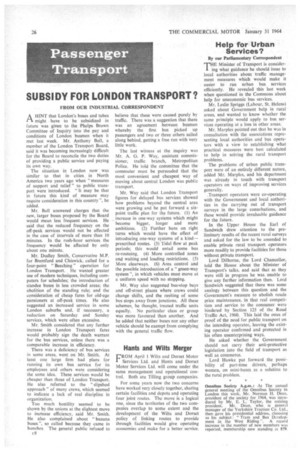SUBSIDY FOR LONDON TRANSPORT?
Page 28

If you've noticed an error in this article please click here to report it so we can fix it.
FROM OUR INDUSTRIAL CORRESPONDENT
1-1 A HINT that London's buses and tubes might have to be subsidized in future was given to the Phelps Brown Committee of Inquiry into the pay and conditions of London busmen when it met last week. Mr. Anthony Bull, a member of the London Transport Board, said it was becoming increasingly difficult for the Board to reconcile the two duties of providing a public service and paying its own way. The situation in London now was similar to that in cities in North America two years ago when "measures of support and relief" to public transport were introduced. "It may be that in future this kind of measure may require consideration in this country ", he added. Mr. Bull answered charges that the new, larger buses proposed by the Board would mean less frequent services. He said that the reduced frequency on the off-peak services would not be affected in the case of intervals of more than 10 minutes. In the rush-hour services the frequency would be affected by only about one minute.
Mr. Dudley Smith, Conservative M.P. for Brentford and Chiswick, called for a four-point " Beeching " operation for London Transport. He wanted greater use of modern techniques. including computers for schedules; the introduction of standee buses in less crowded areas; the abolition of the standing rule; and the consideration of cheap fares for old-age pensioners at off-peak times. He also suggested an increased service in some London suburbs and, if necessary, a reduction on Saturday and Sunday services, which were often excessive. Mr. Smith considered that any further increase in London Transport fares would probably sign the death warrant for the bus services, unless there was a comparable increase in efficiency. There was a deficiency of bus services in some areas, went on Mr. Smith. At least one large firm had plans for running its own bus service for its employees and others were considering the same idea. These services would be cheaper than those of London Transport. He also referred to the "slipshod approach" of many crews, which seemed to indicate a lack of real discipline in organization. Too much hostility seemed to be shown by the unions at the slightest move to increase efficiency, said Mr. Smith. He also complained about banana buses ". so called because they came in bunches. The general public refused to
c8
believe that these were caused purely by traffic. There was a suggestion that there was an agreement between busmen whereby the first bus picked up passengers and two or three others sailed along behind, getting a free run with very little work.
The last witness at the inquiry was Mr. A. G. P. Way, assistant commissioner, traffic branch, Metropolitan Police. He told the committee that the commuter must be pursuaded that the most convenient and cheapest way of moving about central London Was public transport.
Mr. Way said that London Transport figures for delayed bus services showed how problems beyond the central area were growing and he put forward a sixpoint traffic plan for the future. (1) An increase in one-way systems which might become bigger, longer and more ambitious. (2) Further bans on right turns which would have the effect of introducing one-way systems of a kind— prescribed routes. (3) Tidal flow at peak periods; this would entail some bus re-rotiteing. (4) More controlled zones and waiting and loading restrictions. (5) More clearways. (6) Area control and the possible introduction of a "green-way system ", in which vehicles must move at a uniform speed with no stopping.
Mr. Way also suggested bus-stop bays and off-street places where crews could change shifts, and the resit* of some bus stops away from junctions. All these schemes, he thought, treated traffic units equally. No particular class or group was more favoured than another. And he added that neither buses nor any other vehicle should be exempt from complying with the general traffic flow.




















































































































